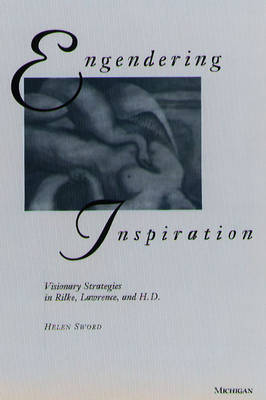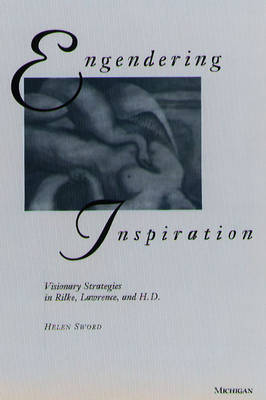
- Retrait gratuit dans votre magasin Club
- 7.000.000 titres dans notre catalogue
- Payer en toute sécurité
- Toujours un magasin près de chez vous
- Retrait gratuit dans votre magasin Club
- 7.000.0000 titres dans notre catalogue
- Payer en toute sécurité
- Toujours un magasin près de chez vous
Engendering Inspiration
Visionary Strategies in Rilke, Lawrence, and H. D.
Helen Sword
Livre relié | Anglais
129,45 €
+ 258 points
Description
In a culture where passivity and receptivity are stereotypically deemed "feminine" traits, while authority and power are typically associated with maleness, the idea of poetic inspiration--which invests an individual with authority through the act of reception--sets up a conflict between traditional gender roles. In Engendering Inspiration, Helen Sword explores this conflict in the visionary poetics of three important modernist poets, Rainer Maria Rilke, D. H. Lawrence, and H.D. Sword argues that these three poets were paradigmatic in their struggle to come to terms with the fundamentally gendered paradoxes of inspiration, whether by appealing to ancient prophetic traditions, by subverting existing cultural stereotypes, or by engaging in revisionist mythmaking.
The first three chapters of the book present a broad overview of the visionary poetry and poetics of each writer. The final two chapters, in contrast, employ closer reading and a more comparative analysis, discussing how Rilke, Lawrence, and H.D., through their poetic revisions of the stories of Orpheus and Eurydice and Leda and Zeus, rendered these two ancient tales of gender conflict into modern metaphors for poetic inspiration. In addition, a substantial introductory section traces connections between inspiration and gender in ancient and medieval prophetic and mystical traditions as well as in the works of other twentieth-century poets.
The subjects of inspiration, gender, and modernist literature have not yet been examined together in any major critical study. This book will be important reading for students and scholars of literary theory, feminist theory, and literary modernism.
Helen Sword is Assistant Professor of English, Indiana University.
The first three chapters of the book present a broad overview of the visionary poetry and poetics of each writer. The final two chapters, in contrast, employ closer reading and a more comparative analysis, discussing how Rilke, Lawrence, and H.D., through their poetic revisions of the stories of Orpheus and Eurydice and Leda and Zeus, rendered these two ancient tales of gender conflict into modern metaphors for poetic inspiration. In addition, a substantial introductory section traces connections between inspiration and gender in ancient and medieval prophetic and mystical traditions as well as in the works of other twentieth-century poets.
The subjects of inspiration, gender, and modernist literature have not yet been examined together in any major critical study. This book will be important reading for students and scholars of literary theory, feminist theory, and literary modernism.
Helen Sword is Assistant Professor of English, Indiana University.
Spécifications
Parties prenantes
- Auteur(s) :
- Editeur:
Contenu
- Nombre de pages :
- 280
- Langue:
- Anglais
Caractéristiques
- EAN:
- 9780472105946
- Date de parution :
- 09-01-96
- Format:
- Livre relié
- Format numérique:
- Genaaid
- Dimensions :
- 161 mm x 236 mm
- Poids :
- 625 g

Les avis
Nous publions uniquement les avis qui respectent les conditions requises. Consultez nos conditions pour les avis.






